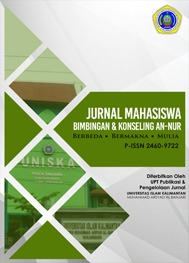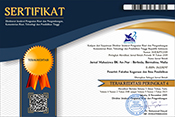EMPLOYEE WELL BEING DITINJAU DARI ORGANIZATIONAL JUSTICE DAN JOB DEMAND PADA TENAGA AHLI LABORATORIUM MEDIK (ATLM)
(1) Universitas Selamat Sri Kendal
(2) Universitas Selamat Sri Kendal
(3) Universitas Selamat Sri Kendal
(*) Corresponding Author
Sari
This research aims to find out the relationship between organizational justice and job demand on employee well-being of medical laboratory experts (ATLM). The subjects in this research were 100 medical laboratory experts (ATLM) with the criteria of having worked for at least 1 year, having an active Registration Certificate (STR), a minimum of 1 year of service and being male or female. The research results show the major hypothesis, namely that there is a significant relationship between organizational justice and job demand on employee well-being with a correlation value of Ry(1,2) of 0.636, calculated F of 25,052 P=0.000 (p < 0.05). Meanwhile, the first minor hypothesis is that there is a significant positive relationship between organizational justice and employee well-being with a correlation value of r1y = 0.481 p = 0.000 (p < 0.05). That is, the higher the organizational justice, the higher the level of employee well being. Furthermore, for the second minor hypothesis, there is a significant negative relationship between job demand and employee well-being with a correlation value r1y = 0.481 p = 0.00 (p < 0.05). This means that the higher the job demand, the lower the level of employee well being among medical laboratory experts..
Keywords: Employee Well Being; Organizational Justice; Job Demand; Medical Laboratory Experts (ATLM)
Kata Kunci
Teks Lengkap:
PDFReferensi
Adams, J. M. (2019). The Value of Worker Well-Being. In Public Health Reports (Vol. 134, Issue 6). https://doi.org/10.1177/0033354919878434
Adawiyah, R., & Blikololong, J. B. (2018). Hubungan Antara Dukungan Sosial Dan Burnout Pada Karyawan Rumah Sakit. Jurnal Psikologi, 11(2), 190–199. https://doi.org/10.35760/psi.2018.v11i2.2264
Arofiati, F., & Muntu, F. F. (2021). Dampak Psikologis Tenaga Kesehatan Pada Masa Pandemi Covid-19 : Literatur Review. Jurnal Ilmiah Perawat Manado, 09(01), 110–122.
Ashley, C., James, S., Williams, A., Calma, K., Mcinnes, S., Mursa, R., Stephen, C., & Halcomb, E. (2021). The psychological well-being of primary healthcare nurses during COVID-19: A qualitative study. Journal of Advanced Nursing, 77(9), 3820–3828. https://doi.org/10.1111/jan.14937
Aurora, M. H., & Suhariadi, F. (2018). Hubungan antara organizational justice dengan perilau produktif pada karyawan bank x kantor cabang bekasi. Jurnal Psikologi Industri Dan Organisasi, 7(1993), 50–59.
Colquitt, J. A. (2012). Organizational justice. In The Oxford Handbook of Organizational Psychology (Vol. 1). Oxford university Press. https://doi.org/10.4324/9781315663043-22
Demerouti, E., & Bakker, A. B. (2011). The Job Demands?Resources model: Challenges for future research. SA Journal of Industrial Psychology, 37(2), 1–9. https://doi.org/10.4102/sajip.v37i2.974
Deng, G., Huang, C., Cheung, S. P., & Zhu, S. (2021). Job Demands and Resources and Employee Well-Being in the Chinese Nonprofit Sector. Frontiers in Psychology, 12(December). https://doi.org/10.3389/fpsyg.2021.780718
Diana, A. M., & Frianto, A. (2020). Hubungan Antara Job Demand Terhadap Kinerja Karyawan Melalui Burnout. BIMA : Journal of Business and Innovation Management, 3(1), 17–33. https://doi.org/10.33752/bima.v3i1.303
Dominica, V. S., & Wijono, S. (2022). The Relationship Between Job Demand And Workplace Well Being For Generation Z Employees In Jakarta. Psikologia : Jurnal Psikologi, 4(2), 1–9. https://doi.org/10.21070/psikologia.v4i2.1640
Harter, J. K., Schmidt, F. L., & Keyes, C. L. M. (2004). Well-being in the workplace and its relationship to business outcomes: A review of the Gallup studies. Flourishing: Positive Psychology and the Life Well-Lived., December 2013, 205–224. https://doi.org/10.1037/10594-009
Huang, Q., Xing, Y., & Gamble, J. (2018). Job demands-resource: a gender perspektive on employee well-being and resilience in retail stors in china. Angewandte Chemie International Edition, 6(11), 951–952., 3(1), 10–27. https://medium.com/@arifwicaksanaa/pengertian-use-case-a7e576e1b6bf
Huong, L., Zheng, C., & Fujimoto, Y. (2016). Inclusion, organisational justice and employee well-being. International Journal of Manpower, 37(6), 945–964. https://doi.org/10.1108/IJM-12-2015-0212
Ismail, H., & Warrak, A. (2019). The Impact of Employee Well-being on Employee Retention. International Journal of Business and Management Invention (IJBMI) ISSN, 8(12), 33–37.
Katz, M. H. (2011). Multivariable analysis: A practical guide for clinicians, second edition. In Multivariable Analysis: A Practical Guide for Clinicians. https://doi.org/10.1017/CBO9780511811692
Kurnia, C., & Widigdo, A. M. N. (2021). Effect of Work-Life Balance, Job Demand, Job Insecurity on Employee Performance at PT Jaya Lautan Global with Employee Well-Being as a Mediation Variable. European Journal of Business and Management Research, 6(5), 147–152. https://doi.org/10.24018/ejbmr.2021.6.5.948
Kusuma, M. W., Herawati, F., Setiasih, S., & Yulia, R. (2021). Persepsi Tenaga Kesehatan dalam Praktik Kolaborasi Interprofesional di Rumah Sakit di Banyuwangi. Media Kesehatan Masyarakat Indonesia, 20(2), 106–113. https://doi.org/10.14710/mkmi.20.2.106-113
Noor, A. F. (2020). Pengaruh organizational justice terhadap tingkat employee engagement The influence of organizational justice on the level of employee engagement. Jurnal Manajemen, 12(2), 199–208.
Page, K. M., & Vella-Brodrick, D. A. (2009). The “what”, “why” and “how” of employee well-being: A new model. Social Indicators Research, 90(3), 441–458. https://doi.org/10.1007/s11205-008-9270-3
Rahmi, T. R., Agustiani, H. A., Harding, D. H., & Fitriana, E. F. (2021). Adaptasi Employee Well-Being Scale (EWBS) Versi Bahasa Indonesia. Jurnal Psikologi, 17(2), 93. https://doi.org/10.24014/jp.v17i2.13112
Rizky, T. R., & Sadida, N. (2019). Hubungan antara Job Insecurity dan Employee Well Being pada Karyawan yang Bekerja di Perusahaan yang Menerapkan PHK di DKI Jakarta. Jurnal Empati, 8(1), 329–335. https://doi.org/10.14710/empati.2019.23651
Sabil, A. P. (2021). Pengaruh employee well-being dan job satisfaction terhadap employee performance. Jurnal Ilmu Manajemen, 9(4), 1341–1348. https://doi.org/10.26740/jim.v9n4.p1341-1348
Sadida, N. (2018). Hubungan Antara Health Consciousness Dengan Employee Well-Being Pada Karyawan Di Dki Jakarta. Journal of Psychological Science and Profession, 2(3), 216. https://doi.org/10.24198/jpsp.v2i3.19223
Utami, L., Hapsari, S., & Widyandana. (2016). Hubungan Antara Sikap Dan Perilaku Kolaborasi Dan Praktik Kolaborasi Interprofesional Di Ruang Rawat Inap Rumah Sakit Panti Rapih. Jurnal Keperawatan Muhammadiyah, 1(1), 2016.
Utami, N. Y., & Sylvia, V. S. S. (2021). Pengaruh Job Demands dan Job Resources terhadap Turnover Intention Karyawan Godrej Indonesia. JIMEN Jurnal Inovatif Mahasiswa Manajemen, 2(1), 76–82.
Wardani, L. M. I., & Noviyani, T. (2020). Employee Well-being as mediator of correlation between Psychological Capital and Psychological Climate. Journal of Educational, Health and Community Psychology, 9(2), 47–63. https://doi.org/10.12928/jehcp.v9i2.14357
Wiseman, J., & Stillwell, A. (2022). Organizational Justice: Typology, Antecedents and Consequences. Encyclopedia, 2(3), 1287–1295. https://doi.org/10.3390/encyclopedia2030086
Wulan, D. K., & Putri, M. (2016). Job demands dan workplace well-being pada guru sekolah luar biasa negeri. JPPP - Jurnal Penelitian Dan Pengukuran Psikologi, 5(1), 28–38. https://doi.org/10.21009/jppp.051.05
Yean, T. F., & Yusof, A. A. (2016). Organizational Justice: A Conceptual Discussion. Procedia - Social and Behavioral Sciences, 219, 798–803. https://doi.org/10.1016/j.sbspro.2016.05.082
Yuwono, T., Novitasari, D., Hutagalung, D., Sasono, I., Silitonga, N., & Asbari, M. (2020). Peran Organizational Justice terhadap Komitmen Organisasional: Analisis Mediasi Kepuasan Kerja Dosen Perguruan Tinggi Swasta. EduPsyCouns: Journal of Education, Psychology and Counseling, 2(1), 582–599.
Zheng, X., Zhu, W., Zhao, H., & HZang, C. (2015). Employee Well-Being in Organizations : Theoretical Model, Scale Development, And Cross-Cultural Validation. Journal of Organizational Behavior, 36, 621–644. https://doi.org/10.1002/job
DOI: http://dx.doi.org/10.31602/jmbkan.v9i2.12416
Refbacks
- Saat ini tidak ada refbacks.
Akun Akademik Anda Terhubung dengan :
Didedikasikan Untuk:
Jurnal Mahasiswa BK An-Nur : Berbeda, Bermakna, Mulia disseminated below Lisensi Creative Commons Atribusi 4.0 Internasional.
















